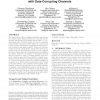Free Online Productivity Tools
i2Speak
i2Symbol
i2OCR
iTex2Img
iWeb2Print
iWeb2Shot
i2Type
iPdf2Split
iPdf2Merge
i2Bopomofo
i2Arabic
i2Style
i2Image
i2PDF
iLatex2Rtf
Sci2ools
150
Voted
HYBRID
2011
Springer
2011
Springer
Reputation-based networked control with data-corrupting channels
We examine the problem of reliable networked control when the communication channel between the controller and the actuator periodically drops packets and is faulty i.e., corrupts/alters data. We first examine the use of a standard triple modular redundancy scheme (where the control input is sent via three independent channels) with majority voting to achieve mean square stability. While such a scheme is able to tolerate a single faulty channel when there are no packet drops, we show that the presence of lossy channels prevents a simple majority-voting approach from stabilizing the system. Moreover, the number of redundant channels that are required in order to maintain stability under majority voting increases with the probability of packet drops. We then propose the use of a reputation management scheme to overcome this problem, where each channel is assigned a reputation score that predicts its potential accuracy based on its past behavior. The reputation system builds on the majo...
| Added | 23 Dec 2011 |
| Updated | 23 Dec 2011 |
| Type | Journal |
| Year | 2011 |
| Where | HYBRID |
| Authors | Shreyas Sundaram, Jian Chang, Krishna K. Venkatasubramanian, Chinwendu Enyioha, Insup Lee, George J. Pappas |
Comments (0)

